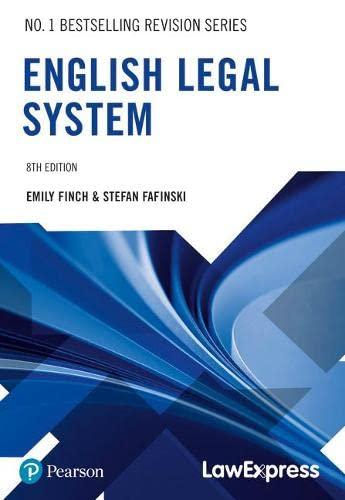Answered step by step
Verified Expert Solution
Question
1 Approved Answer
Page 271 CASE 11-2 UNITED STATES OF AMERICA v. LOUIS KOVEL UNITED STATES COURT OF APPEALS FOR THE SECOND CIRCUIT 296 F.2D 918 (1961)



Page 271 CASE 11-2 UNITED STATES OF AMERICA v. LOUIS KOVEL UNITED STATES COURT OF APPEALS FOR THE SECOND CIRCUIT 296 F.2D 918 (1961) Defendant Kovel was an accountant employed by a law firm that specialized in tax law. A grand jury was investigating alleged federal income tax violations by a client of the law firm. Kovel was subpoenaed to testify but refused under the direction of the law firm, whose attorneys advised the Assistant United States Attorney that because Kovel was an employee under the direct supervision of the partners, Kovel could not disclose any communications by the client of the result of any work done for the client, unless the latter consented. The assistant attorney answered that the attorney-client privilege did not apply to one who was not an attorney. Kovel was held in criminal contempt for refusing to testify before a grand jury. He appealed the imposition of criminal sanctions imposed on him. CIRCUIT JUDGE FRIENDLY This appeal from a sentence for criminal contempt for refusing to answer a question asked in the course of an inquiry by a grand jury raises an important issue as to the application of the attorney-client privilege to a non- lawyer employed by a law firm. . Nothing in the policy of the privilege suggests that attorneys, simply by placing accountant, scientists, or investigators on their payrolls and maintaining them in their offices, should be able to invest all communications by clients to such persons with a privilege the law has not seen fit to extend when the latter are operating under their own steam. On the other hand, the complexities of modern existence prevent attorneys from effectively handling clients' affairs without the help of others; few lavvyers could now practice without the assistance of secretaries, file clerks, telephone operators, messengers, clerks not yet admitted to the bar, and aides of other sorts. 'The assistance of these agents being indispensable to his work and the communications of the client being often necessarily committed to them by the attorney or by the client himself, the privilege must include all the persons who act as the attorney's agents.' Indeed, the Government does not here dispute that the privilege covers communications to non-lawyer employees with 'a menial or ministerial responsibility that involves relating communications to an attorney.' We cannot regard the privilege as confined to 'menial or ministerial' employees. Thus, we can see no significant difference between a case where the attorney sends a client speaking a foreign language to an interpreter to make a literal translation of the client's story; a second where the attorney, himself having some little knowledge of the foreign tongue, has a more knowledgeable non-lavwyer employee in the room to help out; a third where someone to perform that same function has been brought along by the client; and a fourth where the attorney,
Step by Step Solution
There are 3 Steps involved in it
Step: 1

Get Instant Access to Expert-Tailored Solutions
See step-by-step solutions with expert insights and AI powered tools for academic success
Step: 2

Step: 3

Ace Your Homework with AI
Get the answers you need in no time with our AI-driven, step-by-step assistance
Get Started


